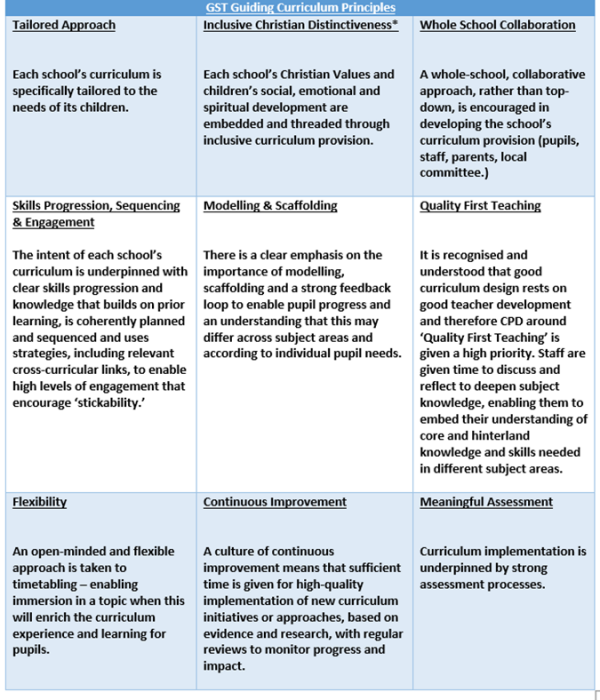Our Curriculum Approach
We currently choose not to mandate a particular curriculum approach across all of our schools. Instead, we have developed a set of guiding principles with the aim of ensuring that every school is providing a high-quality curriculum for its pupils that is aligned with these principles.
In terms of content and coverage, all schools in our Trust are expected to offer a broad and balanced curriculum which includes the full National Curriculum suite of subjects and programmes of study as a minimum.
Where it is sensible and practicable to align approaches within certain subjects and aspects, we encourage schools to move towards this. However, there is no top-down standardisation of curriculum and we are mindful that the individual context of each school should be maintained. For example, where a school has its own outdoor learning area, we would expect this to be incorporated into various subjects.
Curriculum Leadership Group
We run a Curriculum Leadership Group within the Trust; this has representation from every school and provides a forum to enhance and enrich all our schools’ curriculum provision through:
-
Sharing current approaches to curriculum development;
-
Discussing and sharing effective strategies to address intent, implementation and impact;
-
Investigating evidence-based research and exploring new initiatives, including ‘blended’ and remote learning approaches;
-
Working together to establish a set of shared Trust principles for effective curriculum design and implementation within our Christian context and undertaking self-evaluation against these; (*As a mixed multi-academy trust, we welcome both CE and non-CE schools and recognise that all schools will share our Trust values.)
-
Providing a springboard for action research initiatives and cross-school collaboration
-
Undertaking reflective and evaluative activities linked to monitoring the impact of our work over time.
As part of the work of this group, we have developed a set of guiding principles. Our aim is to ensure that every Good Shepherd Trust school is providing a high-quality curriculum for its pupils in line with these nine principles:
GST Guiding Curriculum Principles


Curriculum Networks
Our subject networks support the Trust’s curriculum principles and aim to support high quality curriculum planning and delivery. We aim to provide opportunities for all teachers who lead subjects in their school to be part of a trust curriculum network. Network groups share resources, planning and pedagogy, with the majority of subjects also having regular professional development meetings. Our mantra is that no subject leader is left isolated or without support.
We aim to:
-
Prioritise those subjects / aspects where there is less expertise or teacher confidence across the trust or where cross-trust working has not yet been established;
-
Complement, not duplicate, successful curriculum groups that are already running (ie those from teaching schools or local authority;)
-
Align end-of-year expectations (knowledge and skills) across subjects;
-
Share ‘intent’ rationale / planning across subjects;
-
Develop subject knowledge across subjects, with a focus on foundation subjects;
-
Use skilled practitioners, lead teachers, outside agencies, subject associations to provide professional learning for teachers;
-
Put in place a platform for sharing documentation and resources;
-
Ensure every foundation subject teacher and subject leader has a strong model of planning and assessment that they can draw on.
Currently we run our own networks in the following subjects/aspects:
Curriculum & Assessment, Computing, DT, DSLs, English, Early Years, Geography, History, Inclusion/SEND, PE, Languages, Learning Beyond the Classroom (LBtC), Maths, Music, Science and Wellbeing.
The Network meeting dates may be found on the Events calendar page of our website.

Assessment
Our Trust schools are moving to an aligned assessment system where there is more commonality of expectations of what children should be able to do, know and remember at the end of each year in each National Curriculum subject.
Arbor is used as the Trust-wide MIS (Management Information System) and data tracking system; this allows schools to enter information as regularly as they wish, using summative and/or formative tracking, in order to monitor the progress of pupils and groups of pupils across both core and foundation subjects. Arbor also provides Trust-wide information so that the central team can target school improvement resources quickly and effectively.
We are determined to keep teacher workload manageable and summative assessment meaningful. Therefore, schools are asked to submit termly, teacher-assessed information on each pupil in reading, writing and mathematics. In addition to this, NfER standardised assessments in reading and mathematics (or past SATS papers in relevant year groups) are undertaken twice-yearly at KS2. Standardised assessments enable teachers to identify gaps in pupils' learning, support the judgements made by teachers and provide comparative tracking data across the Trust. Cross-school moderation of writing takes place on a termly basis within hubs, using trust-wide criteria.
The assessment calendar for 2024-25 may be found via this link:
Assessment dates and deadlines 2024-25
Relationships, Sex and Health Education (RSHE)
The Trust's Statement of Intent
Each school was required to use the Statement of Intent to consult upon and develop their own school policy for RSHE.
Please contact your child's school if you require further information.
Careers Programmes
Information regarding the careers programmes, including how providers access our secondary age pupils to talk about technical education and apprenticeships, can be found here. This is a link to the page on Christ's College website.
